Congratulations, class of 2024!
Mount Royal University was proud to see more than 2,150 graduates complete their degrees and diplomas over the 2023/24 academic year — one of the largest graduating classes ever. From June 12 to June 14, six ceremonies celebrated Mount Royal’s newest alumni, who were joined by their supportive friends and family and cheered on by the faculty members and employees who were all a part of their academic journey. Crossing the stage during the ceremonies were more than 1,550 former students, all of whom join the MRU alumni family of more than 115,000 strong.
It was not a “farewell,” however, but more of an “until we meet again,” as all alumni are encouraged to stay in touch and keep accessing the resources MRU provides.
You always belong here!
- Find all seven 2024 Convocation ceremony videos in this playlist
- View the 2024 Convocation program
- Check out this year’s Spotify playlist
- Learn about our Honorary Doctor of Laws recipients
Meet some of our exceptional graduates
- Connor Blake
Bachelor of Health and Physical Education — Physical Literacy - Jonas MacLaurin
Bachelor of Communication — Public Relations - Luciana Peixoto
Bachelor of Arts — Psychology - Emily Trew
Bachelor of Science — General Science - Riley Varhaug
Bachelor of Health and Physical Education — Sport and Recreation Management - Bianca Veltri
Bachelor of Business Administration — Finance
2024 Governor General’s Award recipients
The Governor General’s Academic Medal, established in 1873, is one of the most prestigious awards that can be earned by a student for exceptional academic achievement in a Canadian educational institution. On behalf of Her Excellency, the Right Honourable Mary Simon, governor general, Mount Royal University is pleased to congratulate Tejas Gill and Kolbi Watmough for their outstanding achievements.
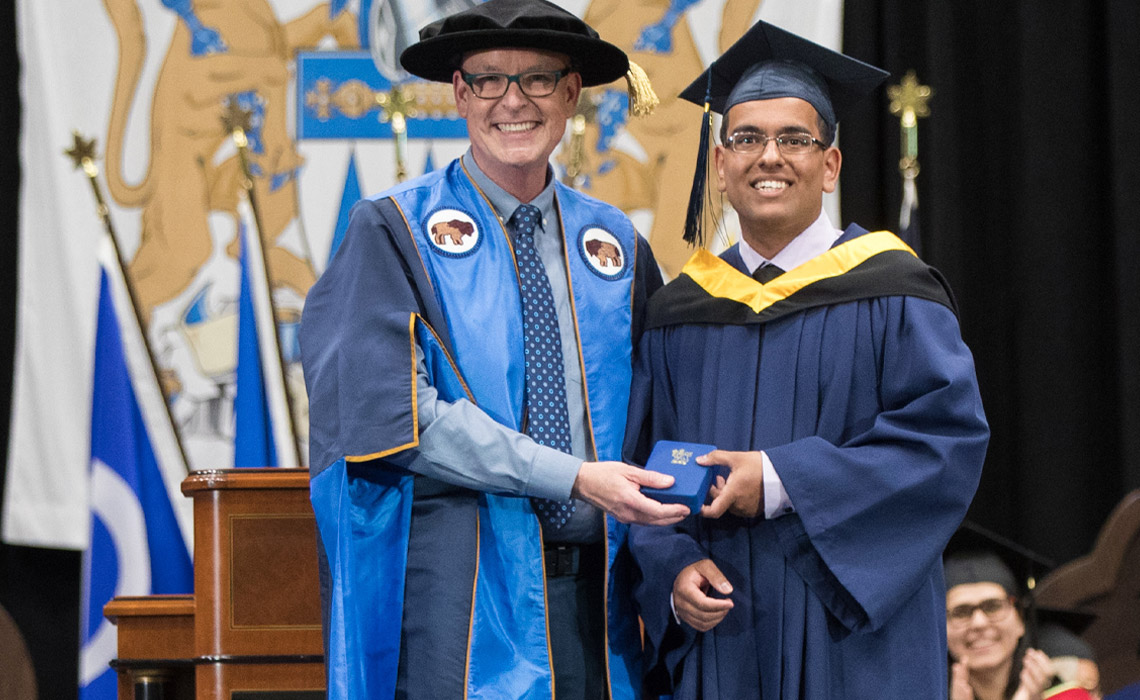
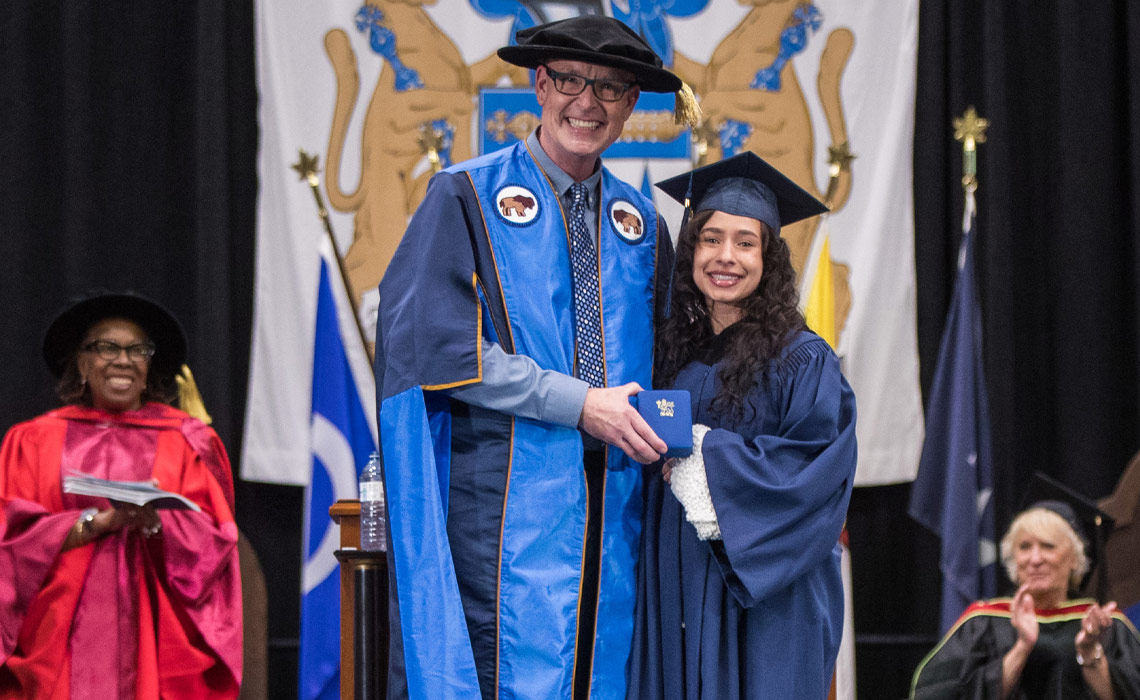
2024 Centennial Gold Medal recipients
MRU’s Centennial Gold Medal award is patterned after the Henry Birks and Sons Gold Medal, which was Mount Royal’s highest award for student academic achievement from 1935 to 1985. The medal commemorates the University’s deep tradition of academic achievement and leadership.
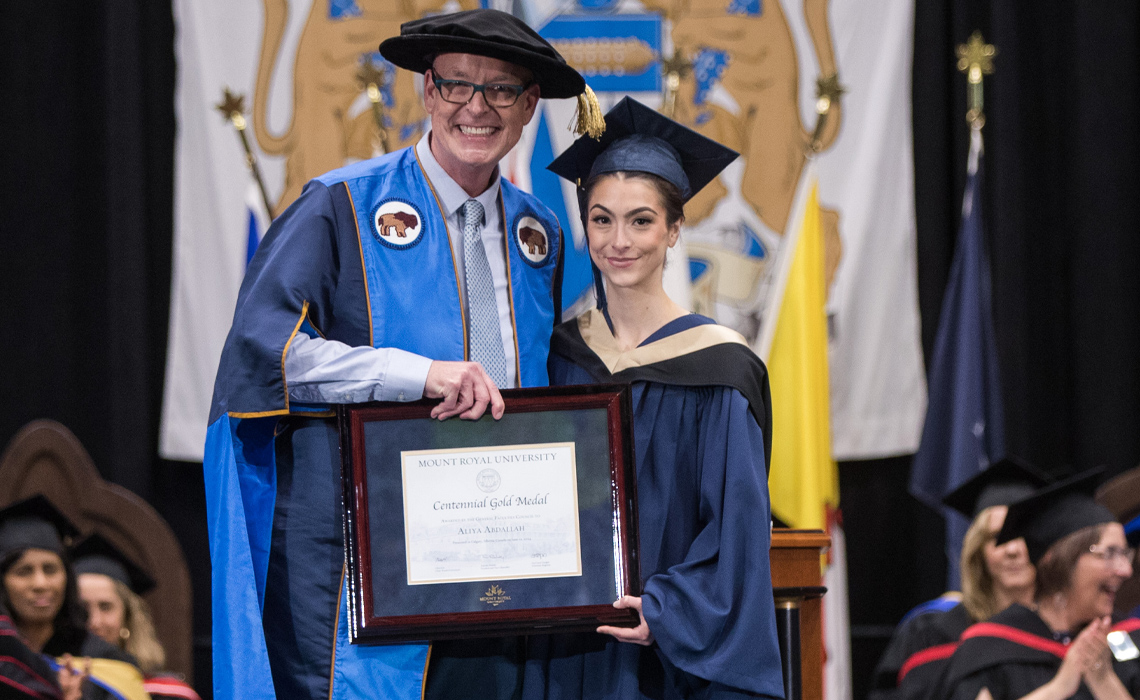
Aliya Abdallah graduated with a Bachelor of Business Administration — Marketing major with a minor in business of sport and recreation and was selected as the 2024 Centennial Gold Medal Recipient for the Faculty of Business and Communication Studies.
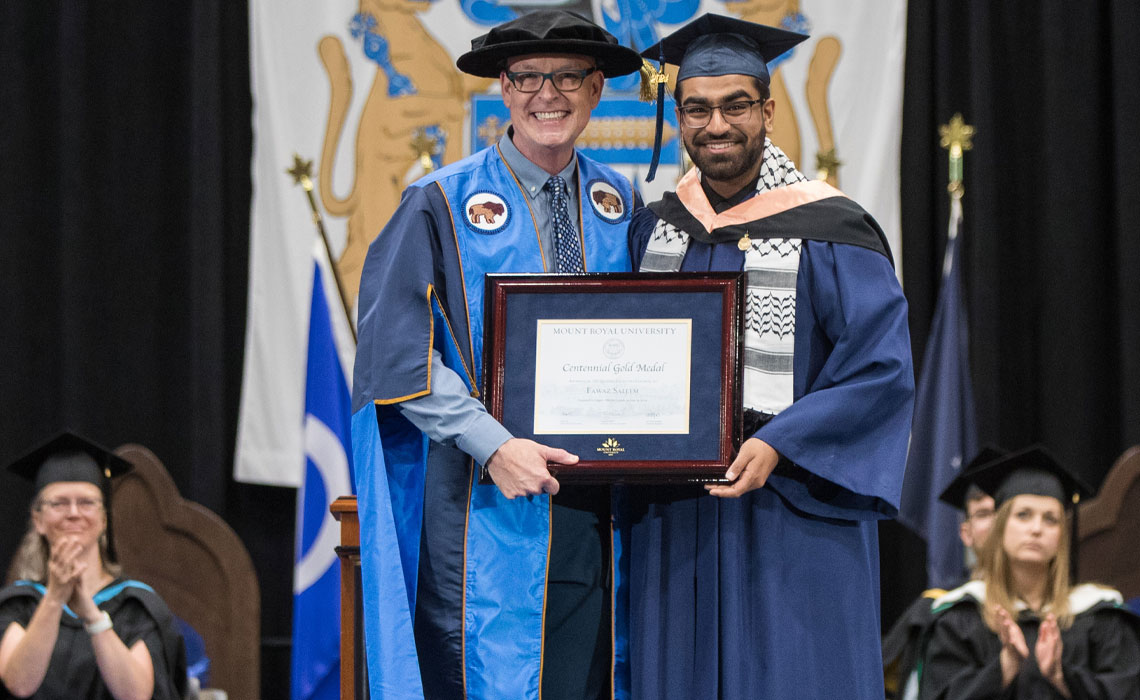
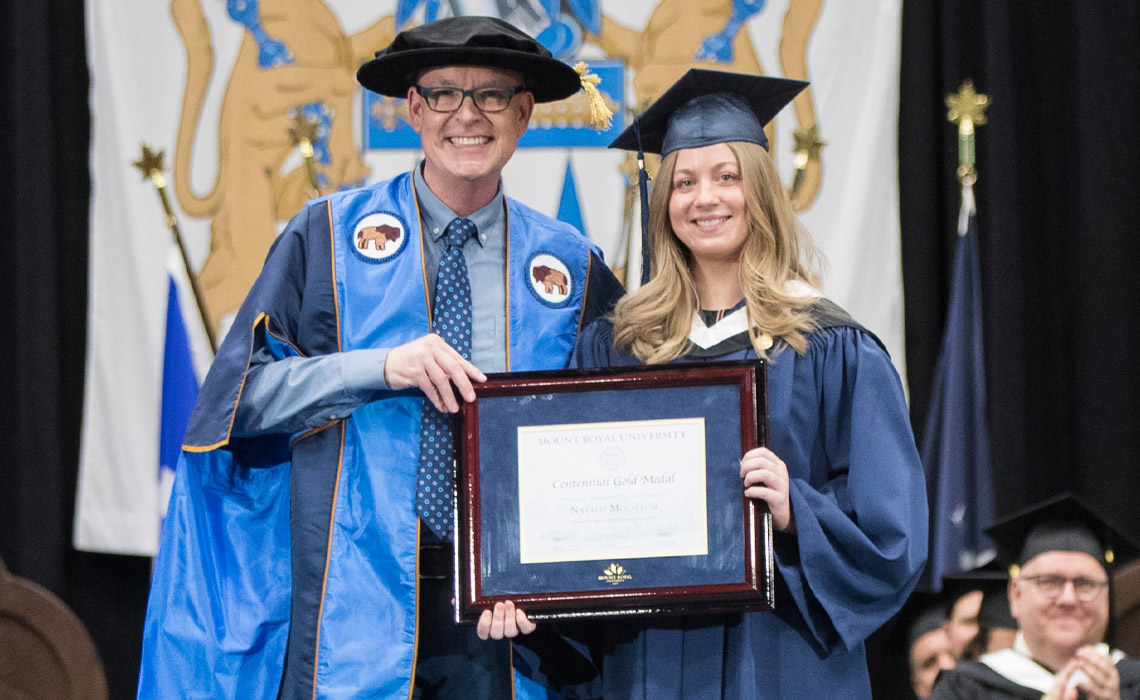
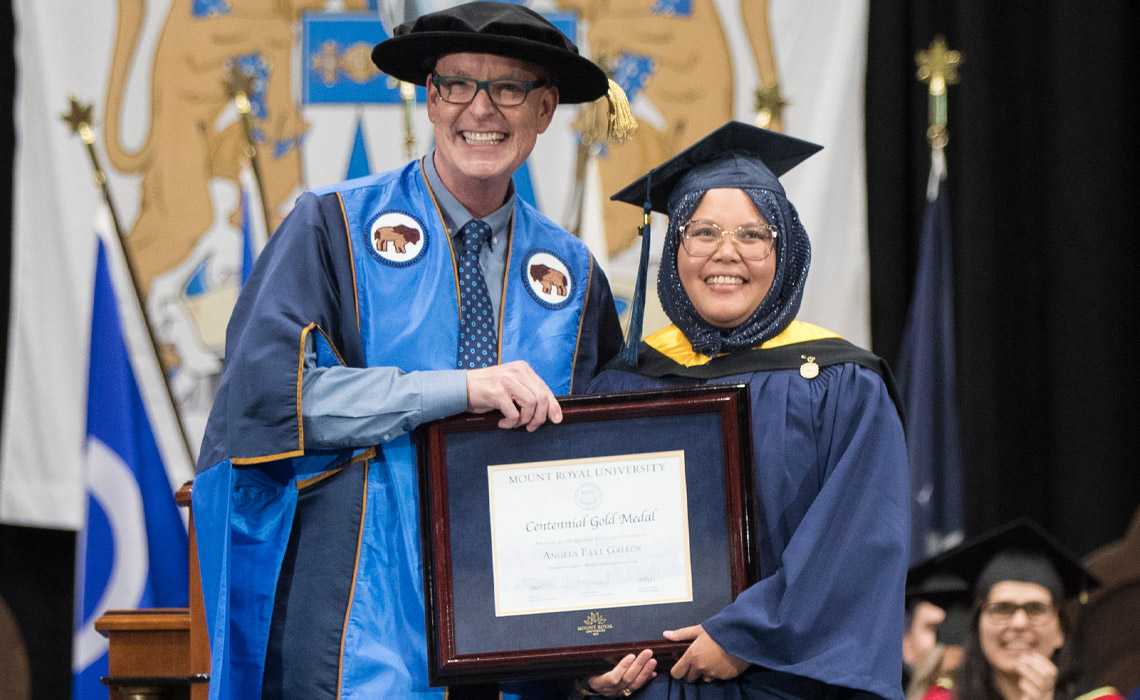
Ceremonies at a glance
Each Convocation ceremony was officially declared assembled for the granting of degrees by MRU’s chancellor, Dawn Farrell. With more than 35 years in the energy business, Farrell served as president and chief executive officer of TransAlta Corporation from 2012 to 2021 and now is president and chief executive officer of Trans Mountain Corp.
Elders from the Mount Royal community then provided blessings and wished the graduates well on their next endeavours.
Elder Miiksika’am (Clarence Wolfleg) told a story of a sequoia forest, which has both enormous trees reaching into the sky and tiny little trees just barely out of the ground. Miiksika’am said the reason the little trees eventually begin to thrive is because the larger trees send their nutrients through the ground to their smaller comrades.
“It’s like you, the graduates, you might think you are a little tree, but through your education you have been fostered into the world. You have become as healthy as that little tree, and you will shine.”
Mount Royal’s president and vice-chancellor, Tim Rahilly, PhD, spoke of the individuality of each student’s story while they created bonds with their peers and professors.
“That is the true power of a MRU education. It requires connection to expand our ideas and thoughts and our willingness to share with others,” Rahilly said.
Although each student has reached the culmination of their studies at Mount Royal, Rahilly said that learning never truly ends for anyone, especially those who have attended a post-secondary institution. It is a professor’s job to foster inquiry and zeal for a topic.
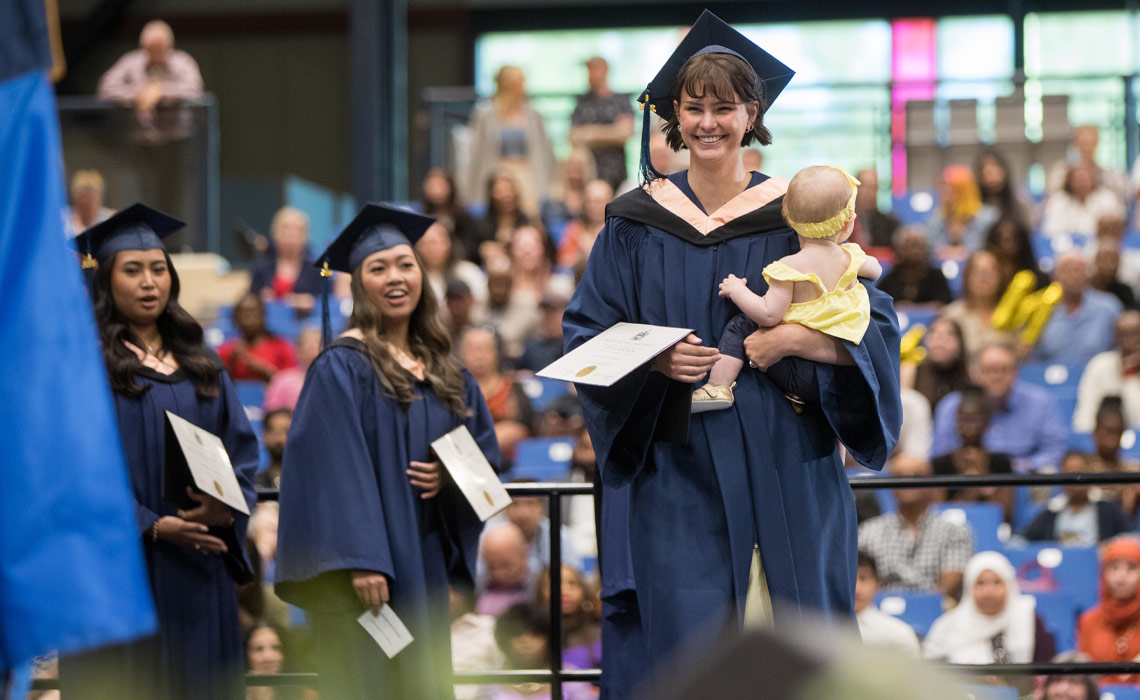
“I believe the ability to seek to understand is the foundation of a broad liberal education, which is what we strive for here at MRU. You have an education, which gives you skills that are in high demand, the skills to adapt to change and, perhaps most importantly, to lead meaningful and productive lives,” Rahilly said.
“Each time we dare to learn in this way, it allows us to make sense of difficult situations and draw on those experiences, these moments of friction, to better understand our neighbour, colleague, and the world around us.”
Farrell then provided her thoughts, saying, “You are more prepared (for this world) than any of us ever were. You leave this institution knowing how to think , how to evaluate, how to analyze and how to ask questions.
“So I have this advice. First, take care of yourselves. Your bodies, your minds, and your souls are up for grabs. Own them, and cherish them. You will need them for another 80 years or so. Second, take care of one another. Build strong friendships and communities, and give more than you take every single day.”
Provost and Vice-President, Academic Chad London, PhD, introduced each honorary doctorate, which was then bestowed by Farrell. The inspirational speeches by the new PhDs can all be found on MRU’s convocation YouTube playlist.
Each graduand then became a graduate as they walked the stage to receive their parchment while their friends and family roared in approval, often raising signs speaking of the collective pride felt for the new alumni. Then each graduating class was addressed by another alumni, one who had already left the University but has maintained their ties through MRU’s Office of Alumni Relations.
Ceremonies were closed with the time-honoured tassel toss, where graduates move their tassels from the right side of their mortarboards to the left. This symbolic gesture officially concludes the Mount Royal educational journey, but not the relationships that will last long into the future.
Chancellor Farrell’s four-year term ends this year and at Friday afternoon’s ceremony, Rahilly thanked her for all she has given the University before presenting her with a Cougars jersey and flowers. He also unveiled a new Chancellor’s Scholarship created in Farrell’s honour that will cover full tuition, books and residence for a student each academic year. It will be MRU’s biggest award to date.
Indigenous Honouring Ceremonies
Oki, Aba Wathtech, Danit’ada, Tanish.
On Tuesday, June 11, Mount Royal held its annual Indigenous Honouring Ceremonies. The event has taken place since 2008, has continuously grown and evolved over the years and celebrates graduates who have learned to walk in both the western and Indigenous worlds.
MRU is home to nearly 1,000 learners who represent First Nation, Métis, and Inuit communities from across Turtle Island. The University graduates more than a hundred First Nation, Métis, Inuit and Non-status Indigenous students yearly.
View this post on Instagram
Tori McMillan, interim director of the Iniskim Centre (Berens River First Nation, Anishinaabe, Treaty 5), provided some background of Indigenous education at Mount Royal, starting with the establishment of Old Sun Community College at Siksika Nation in 1971, and carrying on towards the collaboration of the two schools to deliver a Bachelor of Business Administration with a concentration in Indigenous business and economic development. This program gives students the opportunity to earn an MRU degree within their nation with courses that are developed and taught by local knowledge holders.
At what was then Mount Royal College in 1993, the school welcomed its first cohort of students in the former Aboriginal Education Project (AEP). There was a shared desire to create a pathway for Indigenous learners that would provide greater access and support within post-secondary. The creation of the AEP was the result of planning and a shared sense of commitment between the college and Treaty 7 education advocates. That program is now known as the Indigenous University Bridging Program.
“As an undergraduate university with a focus on teaching and learning, Mount Royal continues to innovate and build on these legacies with programs and partnerships that advance our work to indigenize, decolonize and centre the processes of truth and reconciliation,” McMillan said.
Those recognized at the Indigenous Honouring Ceremonies represented the depth and breadth of educational offerings at MRU. There were graduates of the Indigenous University Bridging Program Certificate program, the Leadership Development Certificate program, the Personal Fitness Trainer Diploma, the Social Work Diploma, the Bachelor of Arts, the Bachelor of Business Administration, the Bachelor of Child Studies, the Bachelor of Communication, the Bachelor of Education, the Bachelor of Health and Physical Education, the Bachelor of Interior Design, the Bachelor of Midwifery, the Bachelor of Science, and the Bachelor of Social Work.
As they crossed the stage at the Taylor Centre for the Performing Arts’ Bella Concert Hall, certificate graduates received a gift bag, while diploma and degree recipients were gifted an eagle feather and Pendelton blanket or a Métis sash.
Marija Small Legs (Piikani Nation, Siksikaitsitapi Blackfoot Confederacy, Treaty 7), was the event’s emcee and is the Iniskim Centre’s student success coordinator. She said, “These students have put in the long hours, worked hard, built community and well-being and embraced their culture to see this through. We couldn’t be more proud of all you.”
University Elder and 2021 Honorary Doctor of Laws recipient Clarence Wolfleg (Elder Miiksika’am, Niitsitapi, Siksikaitsitapi Blackfoot Confederacy, Treaty 7) provided a welcome and blessing. Also in attendance was Mount Royal’s president and vice-chancellor, Tim Rahilly, PhD, who provided his congratulations and words of encouragement to the students for the future.
John Fischer (Cree and Saulteaux, Cowessess First Nation, Treaty 4) is Mount Royal’s interim associate vice-president of indigenization and decolonization. He said, “We refer to education as the new buffalo. The buffalo (ini, tatanka, xani, paskwa mistos) is what leads us to a good life.”
As buffalo provide food, shelter and clothing, so does education, Fischer said, as well as additional riches that we pick up and carry on our educational pathways.
“Many students are the first of their family to be in university. Your presence here is so very important. I consider it an act of decolonization. You are helping to change the role of education away from a tool for assimilation to a role that empowers us. You have faced the challenging forces of life, study, learning, and new ideas, head on — in a courageous way much as a buffalo directly faces a storm.”
Organizers of the Indigenous Honouring Ceremonies would like to thank TransAlta for their generous contribution towards the event.
Professors emeriti
Emeritus is an honorary title granted to someone who retires from a position of distinction, most commonly an academic faculty position. It is a mark of highly distinguished service in the academic realm. Four former Mount Royal professors received the title this year.
Dr. Sharon Smulders, PhD, is a retired professor from the Department of English, Languages and Cultures in the Faculty of Arts. She received her PhD from the University of Sussex, which was preceded by a Master of Arts and a Bachelor of Arts from the University of Ottawa.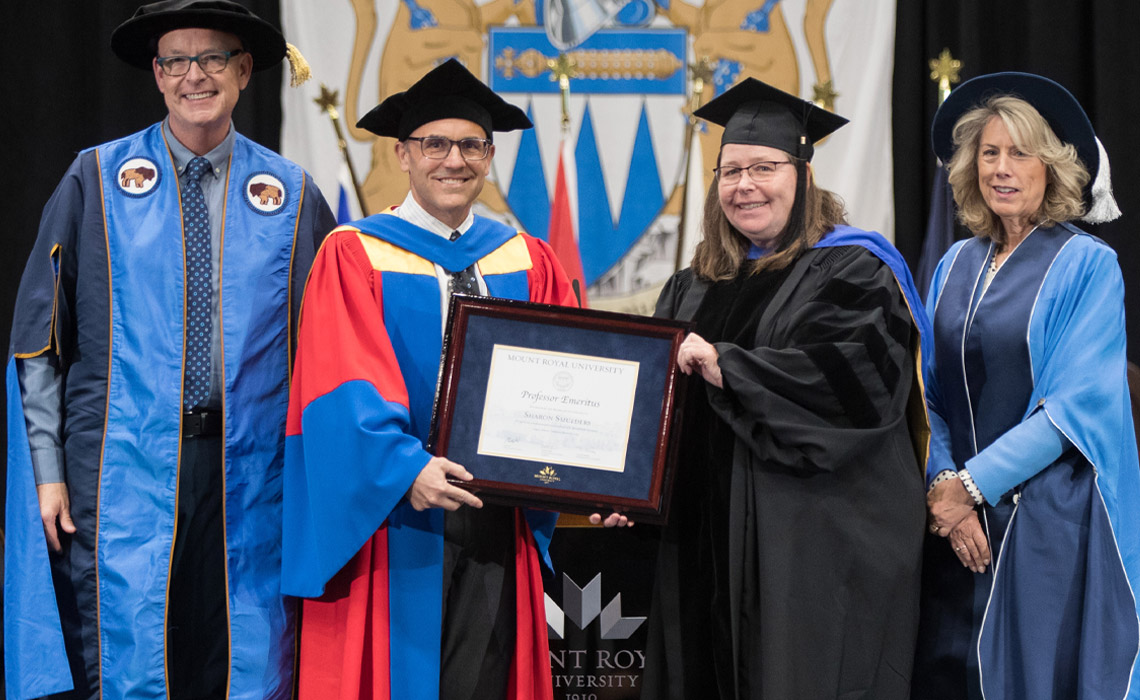
Smulders’ research ranges from 19th-century poetry and women’s writing to studies in children’s literature. In addition to teaching courses in these subjects, she has also published articles on the work of Elizabeth Barrett Browning, Gerard Manley Hopkins, Alice Meynell, Beatrice (Culleton) Mosionier, Christina Rossetti, Dante Gabriel Rossetti, Robert Service, Ann and Jane Taylor, and Laura Ingalls Wilder. Her book, Christina Rossetti Revisited, was published in 1996.
Her current work focuses on environmental issues in children’s picture books.
Dr. Clifford Werier, PhD, is a retired professor from the Department of English, Languages and Cultures in the Faculty of Arts, where he taught early modern literature from 1987 until his retirement in 2022. He is the editor of Shakespeare and Consciousness and of Much Ado About Nothing for the Internet Shakespeare Editions.
His recent publications investigate the phenomenology of time across media in the processing of Shakespearean jokes and the application of meme theory to the spread of contagious ideas in Coriolanus. He is the editor of the Routledge Handbook of Shakespeare and Interface, a collection that focuses on the ways in which the interface features of page, screen, stage and other media influence Shakespearean cognition and understanding. He is also the co-author of three composition textbooks for Nelson Canada.
Dr. John Winterdyk, PhD, is a retired justice studies program professor. He was the first person to receive a PhD in criminology from Simon Fraser University and later served as a visiting scholar — one of only a handful of Canadians to do so — at Germany’s prestigious Max Planck Society. He has held, or currently holds, adjunct and/or visiting positions at several other Canadian universities and similar positions in Namibia and India.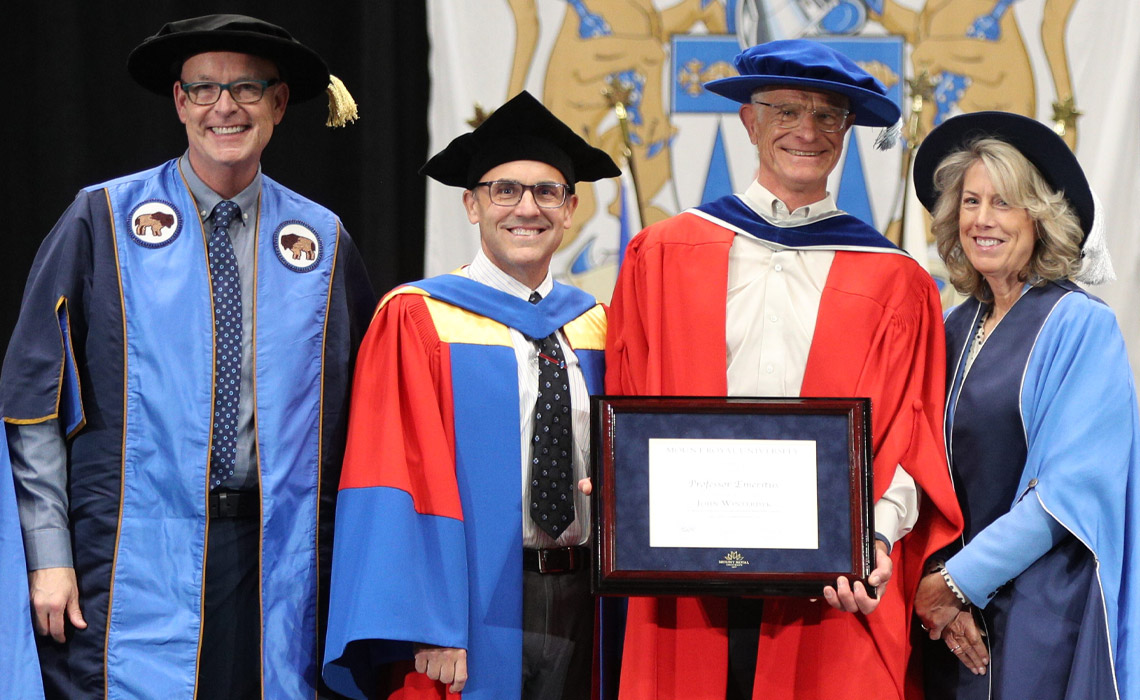
In addition to his diverse research record, Winterdyk has published over 38 academic books and several dozen peer-reviewed articles. He has also been a guest editor of nearly a dozen special journal issues. Winterdyk is the most cited faculty member in the justice studies program and has received several awards from Mount Royal University and the Canadian Criminal Justice and Criminology Association for his work. In 2023, he was nominated for the Stockholm Prize in Criminology for his outstanding scholarly work in human trafficking. He was Mount Royal’s first chair of the Centre for Criminology and Justice Research.
Outside of his academic career, Winterdyk was the first Canadian to win an Ironman Canada race and to break the 10- and nine-hour barriers.
Dr. John Cox, PhD, is a recently retired professor in the Department of Earth and Environmental Sciences in the Faculty of Science and Technology. He received his MSc from the University of Alberta in 1976 and completed his PhD studies at the University of Aberdeen in 1993; his early research focused on the petroleum geology and sedimentary environments of the Mesozoic strata in the Western Canada Sedimentary Basin. He began his career at Mount Royal College in 1983, serving as both coordinator of the university transfer geology program and chair of the Department of Earth Sciences, a position he held for 14 years.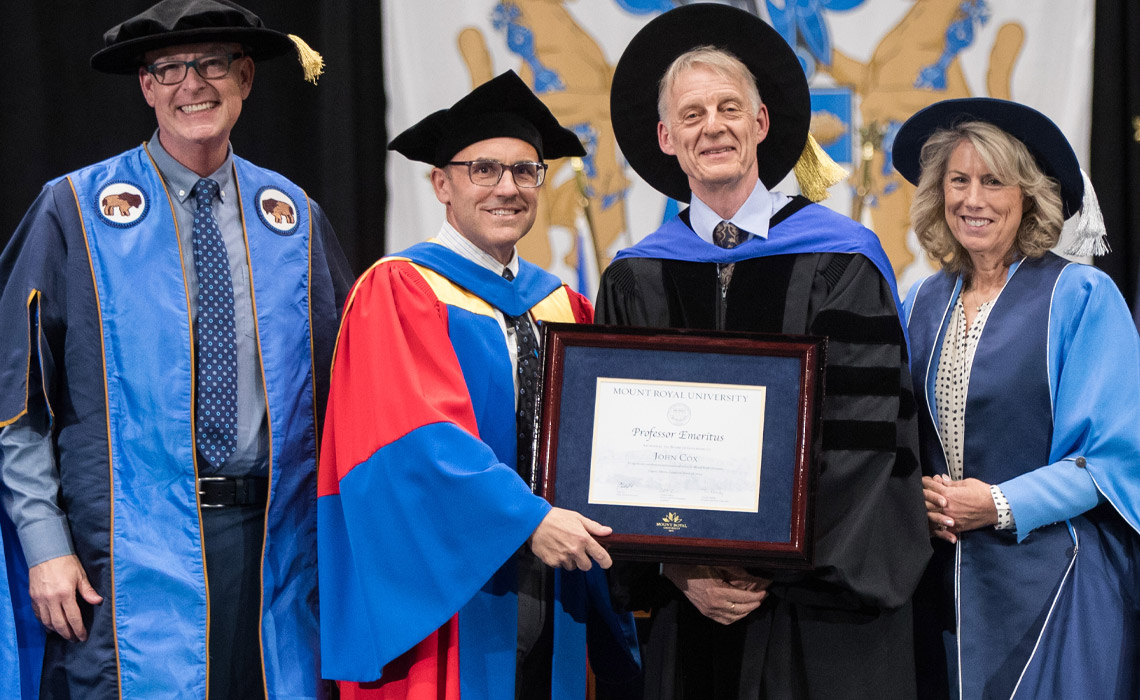
As Mount Royal transitioned towards a degree-granting university he led the development of the MRU Bachelor of Science — Geology program. John received Distinguished Faculty Awards in 1994 and 2012 and a Student Association Teaching Excellence Award in 1995. In 2012, he also became a member of the first group of full professors appointed at Mount Royal University following its transition to university status.
Most recently, up to and since his retirement, he has focussed his research efforts on investigating the quality and quantity of groundwater found in water wells on Hornby Island, British Columbia.

